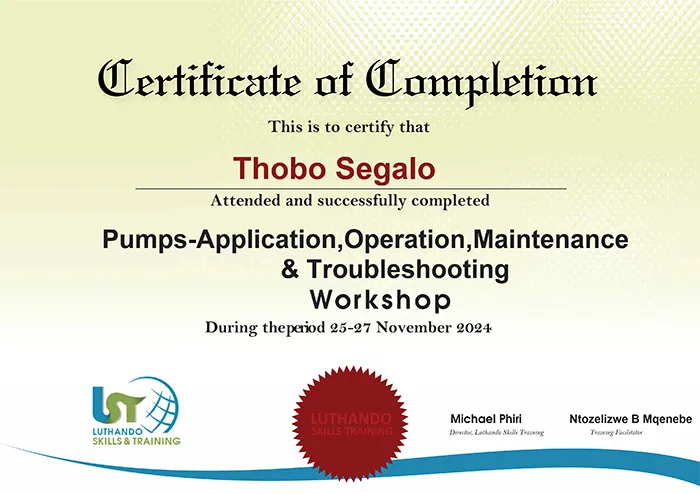INTRODUCTION
R 8,999 Per Delegate
This Luthando Skills Training course on AI for Predictive Maintenance covers essential aspects of predictive maintenance and applications of AI techniques. It covers an overview of predictive maintenance and fundamentals of Artificial Intelligence (AI). This includes predictive maintenance modeling of equipment deterioration, and Condition Base Maintenance (CBM) techniques such as vibration analysis, infra-red-thermography, acoustic emissions, wear debris and lube analysis. It also includes introduction to machine learning (ML) and AI techniques such as Artificial Neural Networks (ANN), Fuzzy Logic Control (FLC), deep learning and explainable AI (Ex-AI).
Practical case studies will be presented to demonstrate the use of AI related techniques in order to utilize the data that exists in computerized maintenance management systems (CMMS) and provide decision support for selection of the most appropriate maintenance strategies.
This Luthando Skills AI for Predictive Maintenance training course will highlight:
- Traditional maintenance vs. predictive maintenance
- The role of AI in predictive maintenance
- Integration with existing maintenance systems (CMMS, ERP)
- Learning from Failures.
- Challenges, Ethical Considerations, and Future Trends
TRAINING OBJECTIVES
At the end of this AI for Predictive Maintenance training course, you will learn to:
- Understand predictive maintenance techniques and CBM technologies
- Learn about ML and AI concepts and trends.
- Design and develop methods of utilizing AI in the maintenance domain.
- Analyze data and determine most appropriate maintenance policies and actions.
- Apply and explain role of AI in predictive maintenance.
WHO SHOULD ATTEND?
The AI for Predictive Maintenance Training is ideal for professionals seeking to leverage AI for reliability engineering and maintenance management skills.
This Luthando Skills training course is suitable to a wide range of professionals but will greatly benefit:
- Maintenance and Reliability Managers and Planners
- Maintenance and Reliability Supervisors
- Team leaders from each Maintenance craft
- Business leaders, directors and managers
- Data analysts, IT professionals
TRAINING METHODOLOGY
This Luthando Skills AI for Predictive Maintenance course will utilize various proven learning methodologies to ensure full understanding of comprehension, retention, and ability to apply the knowledge presented. This includes tools and techniques, examples, case studies, and small groups activities.
TRAINING SUMMARY
Upon completion of this AI for Predictive Maintenance training course participants and their organizations will achieve the following:
- Use of AI technologies and its impact on increasing the profit within the organization.
- Improved total operational effectiveness and efficiency.
- Stronger and leading-edge competitive advantage.
- Implement and improve critical thinking training skills.
- Enhance digital transformation.
- Enhanced predictive and problem-solving capabilities.
- Improved AI-driven decision analysis.
- Optimized utilization of data collected in exiting CMMS.
- Sharpened learning and innovation capabilities.
- Future-proofed career prospects.
TRAINING OUTLINE
Day 1: Introduction to Predictive Maintenance and AI Fundamentals
- What is Predictive Maintenance (PdM) and focus of research in CBM?
- Key benefits and challenges
- Traditional maintenance vs. predictive maintenance: The P-F Curve
- Industry applications (manufacturing, automotive, aerospace, etc.)
- Introduction to AI, machine learning (ML), and deep learning (DL)
- Overview of supervised, unsupervised, and reinforcement learning
- Key concepts in AI (features, models, algorithms)
- The role of AI in predictive maintenance
Machine Learning Models for Predictive Maintenance
- Key technologies for predictive maintenance
- Explainable AI
- Supervised learning Techniques: Regression models for failure time prediction
- Classification models for predicting failures (e.g., decision trees, random forests, SVM)
- Advanced Machine Learning: Ensemble methods (Random Forests, Gradient Boosting)
- Introduction to neural networks for failure prediction
Day 2: Deep Learning and Time-Series Forecasting
- The Transformer – model architecture.
- Deep Learning Models for Predictive Maintenance
- Introduction to deep learning architectures (CNNs, RNNs, LSTMs)
- Time-series prediction with recurrent neural networks (RNNs)
- Practical considerations for training deep learning models
- Time-series analysis for PdM (trend, seasonality, noise)
- Anomaly detection methods for early fault detection
- Case studies on anomaly detection in industrial settings (e.g., vibrations, temperature, pressure data)
Artificial Intelligence in Maintenance Decision Analysis
- The concept of fuzzy logic.
- Benefits that can result from the application of CMMS
- Evidence of ‘Black Holes’ phenomena in CMMSs
- The Decision-Making Grid (DMG): Part 1 – Strategy Selection (Effectiveness)
- The Decision-Making Grid (DMG): Part 2 – Focused Actions (Efficiency)
- The Decision-Making Grid (DMG): Part 3 – Cost / Benefit Analysis
- Case Studies of applying the DMG framework from Industry
Day 3: Model Deployment, Maintenance, and Future Trends
- Integration with existing maintenance systems (CMMS, ERP)
- Challenges, Ethical Considerations, and Future Trends
- Explainable AI: Performance, Attributable, and Responsible Analytics.
- Challenges in scaling AI for predictive maintenance across industries
- The future of AI in industrial automation and predictive maintenance
- Getting the Best out of Data in Computerized Maintenance Management System (CMMS)
- AI Challenges and AI from its pioneers (from Noble Prize winners in AI).
- What are the accountability and governance implications of AI?



